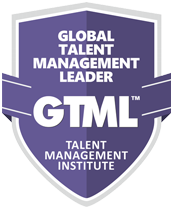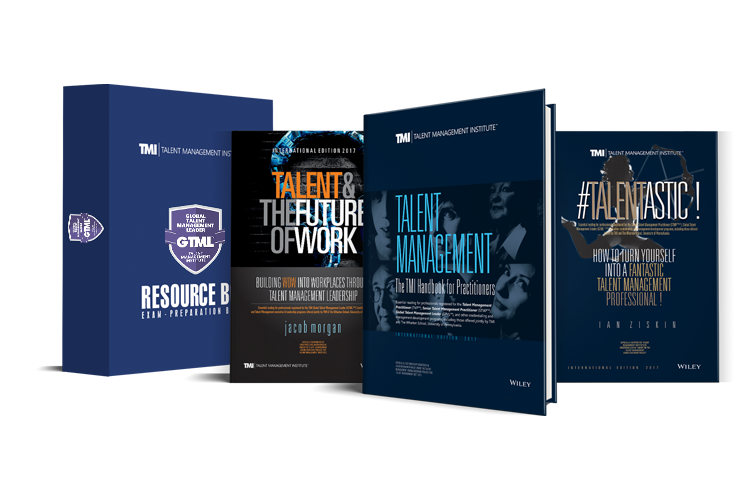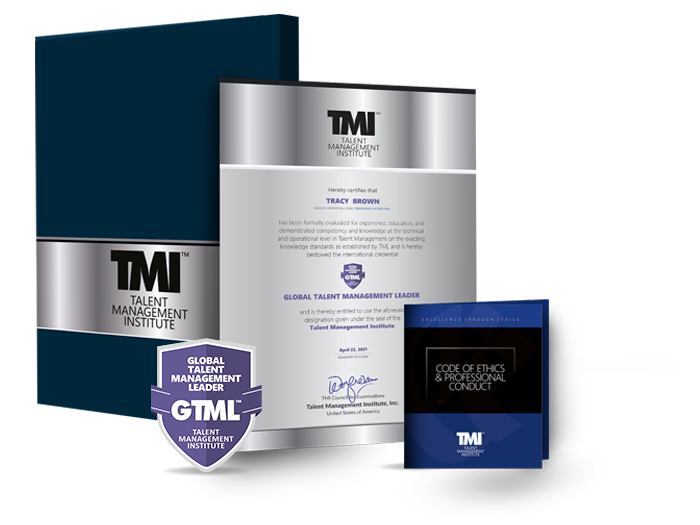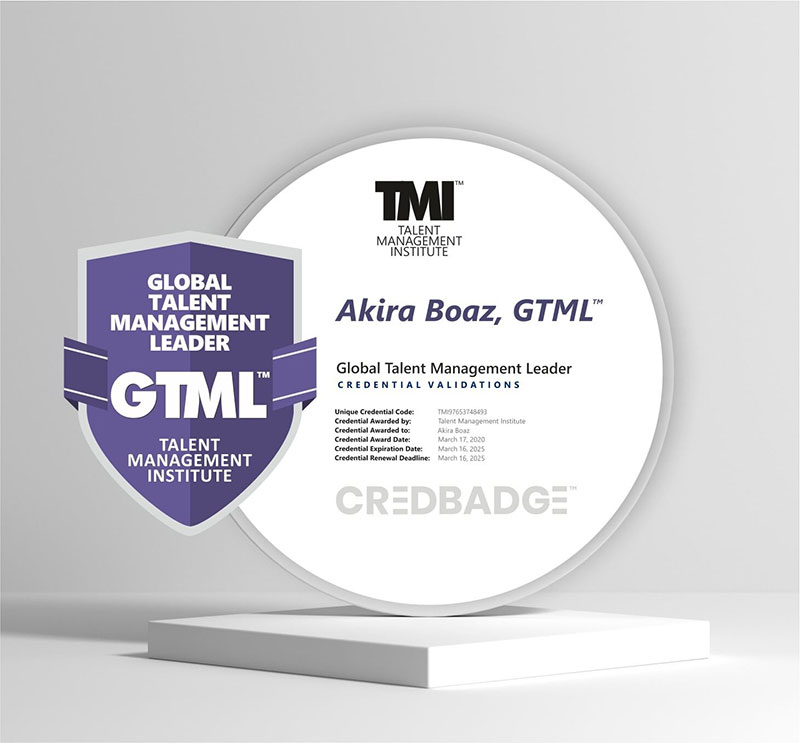GTML™ program package includes leading-edge learning materials in the art and science of Talent Management, and focuses on how business results can be driven and optimized by instituting a multi-cultural talent management approach and mindset throughout organizations that are globally diversified or employ multi-cultural workforce. Furthermore, GTML™ certified professionals qualify directly for the selective TMI Associate Fellow program in Talent Management.
The journey of acquiring the GTML™ credential is packed with stimulating learning in the art and science of Talent Management in a global context. The GTML™ learning program includes a collection of insightful learning material on advanced techniques, frameworks and tools to be practiced and deployed for effectively driving business though Talent Management. The GTML™ journey also provides an organized and accelerated path of preparation for heading the Talent Management/ HR function within a global organization.
Global Talent Management combines strategic business insights, talent consciousness, cross-functional perspectives, and technology to deliver long-term advantages and market-leadership opportunities to companies. A GTML™ certified professional proves the best choice for roles required to help drive business and long-term competitiveness through geographically and culturally diverse talent.

This one-time fee covers 1 (one) GTML™ certification exam attempt, the TMI Resource Box (the TMI Study Kit), the digital badge, the credential case, and all material shipping costs. This fee does not include special local taxes, duties, levies, etc., which may apply to the receiver’s/ consignee’s/ applicant’s country. Refund requests made within 24 hours of making the payment will be subject to a processing charge of US$ 80. No refunds will be issued for registration cancellation requests made after 24 hours of registration.
*We honor military and veterans with special pricing.
Register NowNote : The fee is subject to change without prior notice and does not include the training fee charged by training companies, universities, or institutions authorized to offer exam preparation training for TMI certification exams. TMI is a standards and credentialing body that does not control the delivery of training or education and does not have the authority to govern or mandate the training/program fee charged for any TMI certification by any training company or education provider.
Learn the latest content on Talent Management concepts, frameworks, tools and best practices on standards developed by TMI.
Accelerate your rise into Global HR and Talent Management Leadership roles!
The enriched GTML™ program empowers you to lead global talent strategies in a rapidly evolving world.
The GTML™ program has been meticulously designed to meet the evolving needs of today’s talent management professionals. Featuring an enriched curriculum crafted by world-renowned knowledge leaders, GTML™ offers self-paced, flexible learning pathways that align with your career goals and accommodate your professional schedule. GTML™ includes three distinct components to maximize your learning journey without demanding extensive time away from your work.
The first component provides a comprehensive framework that equips you to use Talent Management as a strategic business tool, extending your influence beyond HR. Through the cornerstone text, Talent Management: The TMI Handbook for Practitioners, you’ll gain deep insights into the principles and practices that underpin effective talent strategies.
In the second component, you’ll explore essential shifts shaping the 21st-century workplace through transformative resources like #Talentastic! and Talent & The Future of Work. These resources help you broaden your perspective, preparing you to tackle leadership challenges with a holistic view of workforce dynamics and global talent demands.
The third component relaunches in 2025 with exclusive, high-impact live seminars led by industry experts, HR leaders, and TMI Fellows. These revitalized sessions will dive deeper into essential topics like agile talent planning, competitive acquisition strategies, accelerated talent development, and succession management, offering cutting-edge insights and rigorously updated content to reflect the latest trends. Recordings of these expert-led seminars will be accessible on your myTMI dashboard, allowing for flexible engagement with the material.
GTML™ is more than a program—it’s a dynamic, evolving conversation on the future of talent management. Driven by a commitment to continuous innovation, GTML™ stays ahead of industry standards, equipping Global Talent Management Leaders with the insights and skills they need to thrive in a rapidly changing landscape.
Click here to register for GTML™Your GTML™ credential earns you a direct pre-qualification into the world’s most prestigious and selective Associate Fellow program in Talent Management for HR leaders.
Notably, this program gives you an opportunity to learn the state-of-the-art through world-class content and courses including on-site residential Masterclass conducted in leading b-school campuses. Designed to help you transform into a high-impact leader, the Associate Fellow of Talent Management becomes the ultimate qualification to have for a rising leader in HR and Talent Management.
The TMI Associate Fellow Program selects from among the world’s leading rising HR professionals. Under the Alumni Privileges Program, your GTML™ credential earns you an exemption from the candidacy verification stage – and places you directly into the stage for final admission consideration. There is also a lower, special alumni fee after you acquire the GTML™ credential. Your myTMI dashboard will reflect your special offer for joining the Associate Fellow Program.
Click here to register for GTML™Your registration for the GTML™ certification program provides you with both a comprehensive resource box, delivered to you, and a suite of resources accessible on your myTMI dashboard, designed to support your journey to certification:
Physical Resources (Delivered to Your Home in the GTML™ Resource Box):
Digital Resources (Available on your myTMI Dashboard):

*The images are for representation only.
The following table summarizes the specific requirements to become a GTML™. There are SIX convenient tracks covering senior HR professionals from diverse backgrounds and experiences to earn a GTML™!
Minimum Qualification Required
Should have completed at least a Bachelor's Degree in Human Resource
Management/ Business/ Management/ HRM-allied disciplines from any accredited institution.
Minimum Work Experience
10 Years or more of full-time work in any of the HR sub-functions.
Minimum Qualification Required
Should have completed at least a Bachelor's Degree in any discipline
from any accredited institution.
Minimum Work Experience
12 Years or more of full-time work in any of the HR sub–functions or
those related.
Minimum Qualification Required
Should have completed a Master's Degree/ Master's Diploma
in Human Resource Management/ Business/ Management/ HRM-allied disciplines.
Minimum Work Experience
8 Years or more of full-time work in any of the HR sub–functions
or those related.
Minimum Qualification Required
Should have completed a Master's Degree/ Master's-level Diploma
in any discipline from an accredited institution.
Minimum Work Experience
10 Years or more of full-time work in any of the HR sub–functions or
those related.
Minimum Qualification Required
Current & past students of Bachelor’s/ Master’s-level
professional qualifications in Human Resource Management/ Business/ Management/ Related disciplines from any of the TMI–recognized institutions.
Minimum Work Experience
7 Years or more of full-time work in any of the HR sub–functions
or those related.
Minimum Qualification Required
Should hold a Bachelor's degree and possess an active credential
by CIPD, HRCI, ATD, SHRM, or by any other global certification bodies
whose credentials TMI may recognize under the QualiFLY™ program.
If you have been a TMI credential holder (TMP™/STMP™) for at least one year, you are eligible to register for GTML™, provided that you meet the candidacy norms. You can pay the reduced fee, and you must pass the GTML™ exam to achieve the GTML™ designation in addition to your active TMI credential.
Minimum Work Experience
7 Years or more of full-time work in any of the HR sub–functions
or those related.
Have questions about eligibility or program focus? Get expert advice from our Program Advisor.
There are SIX distinct stages of your journey toward becoming a GTML™. Please see the process below for an overview of each stage.
For more details, login to your myTMI account.
Before you start your GTML™ application, reviewing the eligibility criteria carefully is essential. This step will help you ascertain whether you possess the required qualifications to initiate the registration process. By doing this, you ensure you are eligible and fully equipped to begin your registration for the GTML™ certification registration.
After confirming that you meet the eligibility criteria, the first step in starting the application process is to create your myTMI account here. This account provides access to a streamlined and convenient online application process. You will be prompted to fill out a form in which you must provide accurate and complete details about your highest educational qualification and work experience; this is a crucial step in ensuring your application is successful. Once you have submitted the application form successfully, you will proceed to the fee payment screen. An email will be sent to you to acknowledge your registration and payment completion.
Note:
After you have successfully completed the registration process, the logistics team will contact you at your registered email address to verify your shipping details and contact information. It is crucial to respond promptly to this email so that your Resource Box can be sent out on time.
GTML™ candidates receive the exam preparation material, also known as “Resource Box,” for essential reading to aid them in preparing for their GTML™ certification exam. The Resource Box contains TMI’s flagship publication - The TMI Handbook for Practitioners, #Talentastic! and Talent & the Future of Work which serve as the essential reading designed to aid candidates in preparing for the GTML™ certification exam.
GTML™ certification exam can be scheduled online from the myTMI dashboard. TMI provides 180 days from the registration completion date for the candidates to earn their GTML™ credential. The candidates are required to prepare and take the exam within this 180-day period.
There is no additional fee for the GTML™ certification exam unless you are scheduling your exam beyond the mandatory 180-day period, retaking the exam, or rescheduling after having missed or canceled your previously scheduled exam. The exam preparation guidelines are available in an e-copy format on your myTMI dashboard. It is strongly advised that you thoroughly familiarize yourself with the exam policies before scheduling the exam; this ensures you can be well-prepared and avoid any problems or confusion during the exam.
When scheduling your examination, it is mandatory that you provide details of two valid, non-expired, government-issued identification documents. Candidates are responsible for scheduling the exam in a timely to secure preferred exam windows. It is advisable to schedule the examination at least 30 days before the expiration of the 180-day period. Read more about exam scheduling here.
If you pass the GTML™ exam and meet the other conditions defined by the TMI Professional Certifications Board, you’re recommended for the award of the GTML™ Credential. Your results will be made available to you through your myTMI dashboard within 10-12 business days from the exam completion date. You will then receive an email requesting you to verify your mailing address for the credential kit that carries the physical certificate, lapel pin, and the TMI code of ethics booklet. After confirming your address, you can expect to receive the credential kit within three to four weeks. You will also receive an email with your digital badge details, allowing you to showcase your achievements on social platforms. Once you have received your GTML™ credential, you will have the privilege to use the designation after your name.
The GTML™ credential is valid for five years. It is important you maintain your certification by renewing it.
Renewal is mandatory to keep your certification current. It is recommended you renew your credential before the Standard credential renewal deadline. By renewing your credential, you show your continuing competence and commitment to the profession. TMI will send you reminder emails for renewal of your credential, wherein you simply have to click the links mentioned in these communications, or log into your myTMI account and register for renewal. To receive email reminders from TMI, please make sure to keep your email address current.

TMI’s computer-based exams are timed for 120 minutes and delivered on the ExamStrong™ platform. You can take the exam online at a time and location of your choice after approval through the ExamStrong™ platform.
Generally, the questions appearing in TMI exams aim to check and validate examinees’ awareness and knowledge of the general frameworks of Talent Management, key practices and trends in 21st century Talent Management, and critical issues, challenges and opportunities in the discipline today. TMI exams, in keeping with the TMI Universal Knowledge Framework, steer clear of general Human Resource Management topics and stay focused on Talent Management. Examinees are expected to already be knowledgeable of Human Resources to prepare them for a more in-depth course in Talent Management.
TMI certification exams feature questions drawn from a wide selection of Talent Management areas, a knowledge in which the TMI body of knowledge defines as essential–to–have for individuals intending to be recognized and credentialed by TMI. The framework or scope of content and coverage of TMI exams is defined reasonably well by the TMI text prescribed for the GTML™ exam–takers – The Talent Management Handbook for Practitioners, Talentastic! and Talent & the Future of Work. More specifically, the following topics have been prescribed by the TMI Professional Certification Board in which the knowledge of examinees is tested:
Click Here to Read More about Mock Exam and Practice Tests| Knowledge Dimensions Covered | Total Questions |
|---|---|
|
PART A: Defining Concepts & Perspectives in Talent Management Consists of questions from five mandatory knowledge dimensions including management, business and Talent Management imperatives of the 21st century, the Talent Management ecosystem, talent‐need analysis, and talent competence assessment frameworks for organizations. |
6 |
|
PART B: Elements of Strategy & Leadership in Talent Management Consists of questions from 10 mandatory knowledge dimensions including Strategic Talent Management, building competitive advantage through integrated Talent Management, sustainable talent development, talent pipeline building, executive onboarding, identifying and assessing high-potential talent, developing leadership talent, and managing leadership talent pools. |
12 |
|
PART C: Critical Focus Areas of Talent Management Practice Consists of questions from eight mandatory knowledge dimensions sweeping across areas like Talent engagement, building functional expertise, managing and measuring Talent Management effectiveness, global Talent Management, talent supplies in global organizations, succession planning, performance management, and technology deployment in Talent Management. |
14 |
|
PART D: International Talent Management Experiences & Insights Consists of insights, experiences, and cases focused on talent development, integrated Talent Management, talent practices, Talent Management adoption, and boardroom view of Talent Management in some of the world’s most enduring business corporations. It also covers CHRO perspectives on Talent Management as well as perspectives on critical research issues and the future of Talent Management practice. |
14 |
|
PART E: Talent Leadership Capabilities Consists of questions from 11 mandatory knowledge dimensions covering aspects like strategic mindset, decision making, thinking and analytics, growth, global management skills, change readiness, personal leadership philosophy, boardroom capabilities, and thought leadership. |
8 |
|
PART F: Future Readiness Includes 21st-century work trends and insights, organizations of today, work and workers of tomorrow, organizations of tomorrow, integration of technology in Talent Management, adaptation for future work, work flexibility and critical perspectives on the declining need of managers in some of the world’s most enduring global business organizations. |
6 |
| Total Number Of Questions | 60 |
A typical GTML™ exam includes a mix of Type A, Type B, and Type C questions for a total of 60 questions.
TYPE A- GENERAL UNDERSTANDING OF CONCEPTS
Questions directly test the examinees' ability to correctly recollect principles
and generally accepted practices in contemporary Talent Management. The answers
to TYPE A questions will reflect examinees' awareness and comprehension of critical
Talent Management concepts as outlined in the TMI body of knowledge. There is only
one CORRECT answer to TYPE A questions, and examinees are scored only if the correct
options are selected.
TYPE B- ABILITY TO APPLY UNDERSTANDING & KNOWLEDGE
Type B questions directly test the examinees' ability to apply their understanding
of the concept of Talent Management in real life scenarios. The answers to TYPE
B questions will reflect examinees' capacities for critical analysis and gauging
Talent Management challenges. Answers will then measure examinees abilities for
devising approaches and resolutions to challenges with a high degree of success
and effectiveness. Type B questions have four answer choices and only one of these
four would be incorrect. The rest of the three of these answers would be principally
correct, but they represent varying levels of accuracy for each respective question.
The best of these three answers carries the maximum 10 marks, and the least suitable
receives 5 marks. The second correct answer with mid-level suitability carries 7.5
marks. Examinees have to choose only one of these four answer choices and they are
scored 0, 5, 7.5, or 10, depending on their choice of answer- option.
TYPE C- UNDERSTANDING OF ISSUES AND ELEMENTS OF PRACTICE IN GLOBAL CONTEXTS
Type C questions directly test the examinees ability to recollect and apply their
awareness and understanding of unique global concepts that directly relate to real-life
practices of Talent Management. Type C questions also have four answer choices and
only one of the four will be incorrect. The rest of the three of these answers would
be principally correct, but they represent varying levels of accuracy for each respective
question. The best of these three answers carries the maximum 10 marks, and the
least suitable receives 5 marks. The second correct answer with mid-level suitability
carries 7.5 marks. Examinees have to choose only one of these four answer choices
and they are scored 0, 5, 7.5, or 10, depending on their choice of answer- option.
The TMI exams aim to assess the candidate's potential and ability to effectively perform a breadth of Talent Management roles and functions in global organizations of all sizes and complexities. The TMI exam system evaluates this potential by testing the candidates' knowledge of Talent Management theory and practice and their ability to apply this knowledge to achieve excellence in their performance of the roles assigned to them. These exams are designed on standards derived from the TMI Standardized Knowledge Architecture for Practice Excellence.
TMI exams evaluate candidates on their knowledge of the principles, latest theories, techniques, tools, and best practices of Talent Management as laid out in TMI-UKF™. These exams expect that the professionals being assessed have intensively gone through the exclusive/ focused readings in the TMI Resource Box and maintain familiarity with the latest developments in Talent Management theories and practices by reading journals and books, listening to podcasts, and participating in professional development programs and events.
The decision to award a TMI credential is not solely based on an individual's score in the exam. While a score between 65-70% is considered to be passing, the TMI Professional Certification Board follows a benchmarking process that scales the actual scores of examinees on a particular section of the exam and compares them to the entire pool of examinees. This approach ensures that examinees from different regions are not affected by uncontrollable systemic or language barriers and that the certification award recommendation system follows an affirmative-action approach.

*The images are for representation only.
The GTML™ Credential Pack is another reason to be excited about GTML™. Cased inside a designer folder-box, your personalized GTML™ Credential-certificate is accompanied by a smart GTML™ designation lapel pin with a copy of the ‘TMI Code of Ethics’ booklet tucked inside.

*The images are for representation only.
GTML™ now comes digitally badged. This means you can share your credential digitally across platforms like your LinkedIn profile or in your emails. The GTML™ digital badge is a verifiable digital token of your GTML™ qualification. Here, anyone you have granted access to, can validate the authenticity of your TMI credential.
Share Your TMI Credential
CredBadge™ is a proprietary, secure, digital badging platform that provides for seamless authentication and verification of credentials across digital media worldwide.
CredBadge™ powered credentials ensure that professionals can showcase and verify their qualifications and credentials across all digital platforms, and at any time, across the planet.

Please enter the License Number/Unique Credential Code of the certificant. Results will be displayed if the person holds an active credential from TMI.